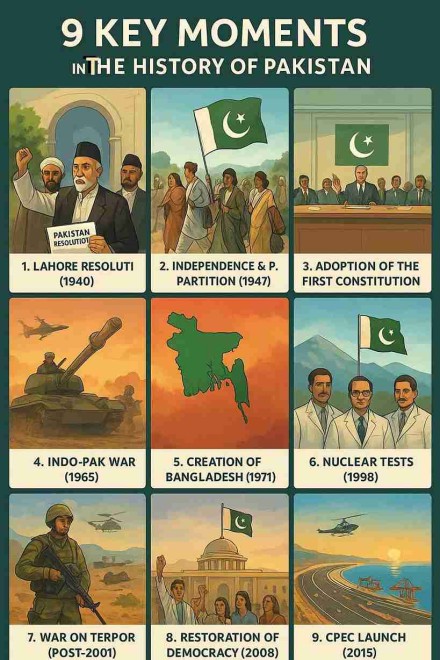DAILY BEST KNOWLEDGE
9 Key Moments in the History of Pakistan
Discover the 9 key moments in the history of Pakistan that changed the nation’s identity. This comprehensive guide explores major Pakistan historical events, providing valuable insights and context for students, researchers, and history enthusiasts.
HISTORY
Iftikhar Ishaque Memon
10/14/20255 min read
Introduction
The history of Pakistan is one of continuity, resistance to change, and, ultimately, stunning change. Pakistan, since its inception in 1947, has had defining moments that have shaped its identity as a nation, its socio-political fabric, and its standing in the region. These moments are important to understand for any individual trying to glean the trajectory of this South Asian nation from the independence movement to its standing in the world today. This article is a play on that concept and looks at nine events that have defined the permanence of Pakistan’s history.
1. The Lahore Resolution (1940)
A significant milestone in the creation of Pakistan is the Lahore Resolution of March 23, 1940. At a session held in Minto Park, Lahore, the leadership laid out the vision of a separate nation for Muslim populations living in the northwestern and northeastern sections of British India. Now known as the “Pakistan Resolution,” this decision was an impetus to mobilize the Muslim population across the subcontinent and lent a clarity of political vision to the movement.
The Lahore Resolution not only unified disparate groups under a single cause but also set the stage for the eventual partition of India. The vision it presented was later realized in the form of an independent Pakistan, making this moment one of the most significant milestones in the nation’s history.
2. Independence and Partition (1947)
British India was divided on August 14, 1947, and Pakistan was founded as an independent state. A moment that had been a dream of leaders like Mohammed Ali Jinnah, Pakistan’s founder, for decades. Yet the ‘partition,’ as it is commonly called, also caused some of the most massive human misery, in which millions moved across new borders amidst violence, death, and uprooting.
Despite the challenges, independence marked a new beginning for the Muslims of South Asia, enabling them to establish a homeland where they could freely practice their religion and culture. The birth of Pakistan is celebrated annually as Independence Day, symbolizing hope, unity, and the enduring spirit of its people.
3. Adoption of the First Constitution (1956)
Following years of political chaos and contention, Pakistan finally, on 23 March 1956, introduced its very first constitution. This constitution, which replaced the Government of India Act 1935, announced Pakistan as an Islamic republic. One of the objectives of the new constitution had been to “set forth a parliamentary system, affirm fundamental rights, and clarify the relationship between the state and Islam.”
However, the implementation of the constitution faced hurdles, including regional disparities and political rivalries. Despite its eventual abrogation, the 1956 constitution laid the groundwork for constitutional development in Pakistan and set a precedent for future legal frameworks.
4. The 1965 Indo-Pak War
The 1965 war between India and Pakistan was a defining moment in the country's military and political history. Triggered by disputes over Kashmir, the conflict showcased the resilience and patriotism of the Pakistani people and armed forces. While the war ended in a ceasefire brokered by the Soviet Union and the United States, it had far-reaching consequences for both nations.
The war fostered a sense of national unity and pride in Pakistan but also highlighted the need for diplomatic solutions to regional disputes. The aftermath led to significant military and economic challenges, shaping Pakistan's defense and foreign policies for years to come.
5. The Creation of Bangladesh (1971)
This was perhaps the most desperate time for Pakistan in 1971, when Pakistan’s eastern wing seceded to become Bangladesh. Political, linguistic, and economic disparities led to a civil war in which India intervened militarily. This conflict resulted in Pakistan’s surrender in Dhaka on December 16, 1971.
The loss of East Pakistan was a profound setback, prompting national introspection and reforms. It also led to significant changes in Pakistan's political and military structures, influencing the country's future trajectory.
6. Nuclear Tests (1998)
In response to Indian nuclear tests earlier that month, Pakistan successfully tested its own nuclear capabilities on May 28, 1998. This day, now commemorated as “Youm-e-Takbeer,” was the day that Pakistan became the 7th nuclear state in the world and the first in the Muslim world. The tests were considered a preventative measure against outside enemies and a show of scientific and technological will.
The nuclear tests brought international attention, resulting in sanctions but also boosting national pride. Pakistan's nuclear status continues to play a crucial role in its defense strategy and regional dynamics.
7. The War on Terror (Post-2001)
The September 11 attacks of 2001, similarly, shook the US and brought Pakistan to the ‘front lines’ of the global War on Terror. The country was then on multiple levels dealing with internal and external issues of multi-dimensional military operations against extremist groups, security threats, and humanitarian crises. While there was a very important role for Pakistan’s support of global partners in the war on terror, this did create complicated political and social fallout.
The War on Terror reshaped Pakistan's security landscape, foreign policy, and civil-military relations, leaving a lasting impact on its society and governance.
8. Restoration of Democracy (2008)
In 2008, after nearly ten years of military rule by General Pervez Musharraf, democracy was reestablished in Pakistan. Civilian rule was reestablished with the general elections and the establishment of a Pakistan Peoples Party-led government. It represented a momentous opportunity for the growth of democratic institutions and for political stability.
The restoration of democracy brought renewed hope for governance reforms, economic development, and protection of civil liberties. Despite ongoing challenges, democratic continuity remains a cornerstone of Pakistan's political evolution.
9. China-Pakistan Economic Corridor (CPEC) Launch (2015)
The launch of the China-Pakistan Economic Corridor (CPEC) in 2015 marked a new era of economic cooperation and development for Pakistan. As a flagship project under China’s Belt and Road Initiative, CPEC aims to connect Gwadar Port to China’s Xinjiang region through a network of roads, railways, and energy projects.
CPEC can enhance Pakistan’s infrastructure and increase trade and job opportunities for the country. But it also brings about issues of debt and regional security. It highlights the regional importance of Pakistan and the country’s desire for economic development.
Conclusion
The history of Pakistan is marked by resilience, change, and striving for progress. The significance of these nine moments is that all have been instrumental in the construction of the nation’s identity, challenges, and achievements. In looking back at these moments in time, a better perspective of Pakistan’s journey and that of its people can emerge.
Frequently Asked Questions (FAQ)
Q1: Why is the Lahore Resolution important in Pakistan’s history?
The Lahore Resolution laid the foundation for the demand for a separate Muslim state, ultimately leading to the creation of Pakistan.
Q2: What was the impact of the 1971 war on Pakistan?
The 1971 war resulted in the secession of East Pakistan and the creation of Bangladesh, prompting significant political and military reforms in Pakistan.
Q3: How did CPEC influence Pakistan’s economy?
CPEC has attracted significant investment, improved infrastructure, and fostered economic cooperation between Pakistan and China, although it also poses financial and security challenges.
Q4: When did Pakistan become a nuclear power?
Pakistan became a declared nuclear power on May 28, 1998, after conducting successful nuclear tests.
Q5: What role did Pakistan play in the War on Terror?
Pakistan was a key ally in the War on Terror, conducting military operations against extremist groups and cooperating with international partners.


© 2025. All rights reserved.
This platform delivers well-researched articles to empower your personal and professional life.


